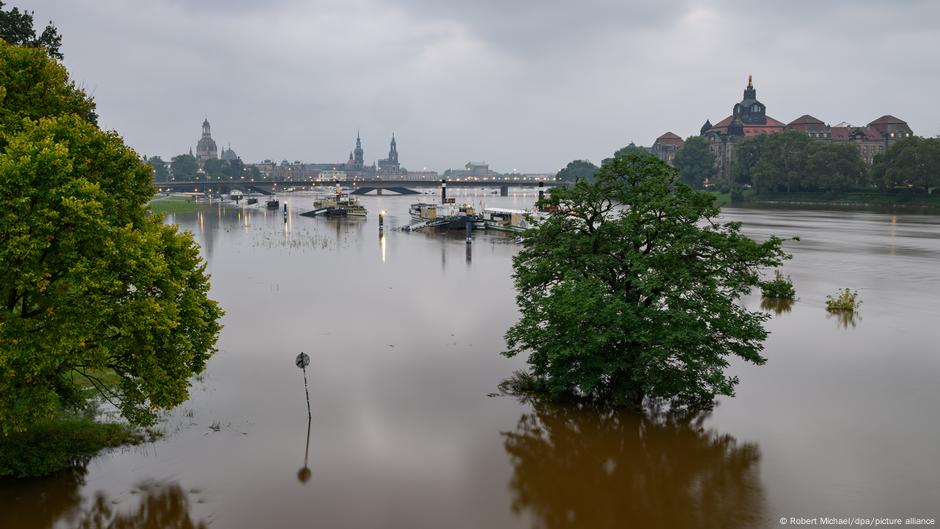When the coalition government comprising the center-left Social Democratic Party (SPD), Greens and neoliberal Free Democratic Party (FDP) emerged after the last German federal election in the fall of 2021, incoming Chancellor Olaf Scholz (SPD) did not object to being called the “Climate Chancellor.” And that was no surprise: the climate crisis had been a top issue during the election campaign.
The new government made the fight against climate change a task for economy ministry – and appointed Vice-Chancellor Robert Habeck from the Greens as its head.
Three and a half years later, climate protection is barely mentioned in campaign speeches.
The dominant issues are how to curb irregular immigration and how to boost Germany’s sluggish economy.
Skeptical view of renewable energy
The head of the center-right Christian Democratic Union (CDU), Friedrich Merz — who according to the polls is most likely to become the next German chancellor — has often said that Germany’s approximately 29,000 electricity-generating wind turbines are a thorn in his side.
In November 2024, Merz told public broadcaster ZDF: “I even believe that if we do things right, we can one day dismantle the wind turbines again — because they are ugly.”
The CDU/CSU bloc believes in nuclear fusion as an energy source, although in this field technological development has been stagnating for decades. Energy generation of electricity from renewable sources such as solar and wind rose to around 56% of German energy production last year.
Merz, however, also wants to revive nuclear power plants, the last of which went offline in 2023. The country’s current goal of reducing greenhouse gases by 65% by 2030, as compared to 1990 levels, is not part of the CDU/CSU’s plans.
Martin Kaiser, a climate expert with the environmental organization Greenpeace, told DW: “The fact that the escalating climate crisis is not among the parties’ top three issues in this election campaign is incomprehensible and irresponsible. Because right now, we need a consistent and socially-oriented climate policy.”
Oil and gas from the US
Recently, the environmental group World Wide Fund for Nature (WWF) was appalled when German Chancellor Olaf Scholz expressed approval of importing oil and liquefied gas from the US in an interview with the German newspaper Handelsblatt Scholz arguing that an increase in imports would lower energy prices.
However, Heike Vesper one of the managing directors of WWF Germany says: “More oil and gas on the world market would only mean one thing: fueling the climate crisis. The consequences would be damage costing billions — and an unstable economy,” she said.
Climate protection remains one of the Greens’ central concerns. Environment Minister Steffi Lemke of the Greens told DW: “I find it negligent that the other parties are now arguing against climate protection. We know that we need climate protection and adaptation to climate change.”
Climate policy setbacks
Greenpeace expert Martin Kaiser believes that the climate balance of the now defunct German government coalition of SPD, Greens and FDP, is sobering. He says that the response to Putin’s war of aggression on Ukraine, and to the Constitutional Court’s that led to a cut in the budget massively damaged confidence especially in the government’s climate policies. In November 2023, the court ruled that the government was not allowed to use around €60 billion ($62 billion) of funds it had earmarked for climate protection. That fund had originally been allocated to combatting the economic effect of the COVID-19 pandemic and the court ruled that reallocating the funds for a different purpose was not possible.
In response to that ruling, the government cut — among other things — a purchase premium for electric cars, which led sales to fall.
In 2023, Economy Minister Robert Habeck’s plans for a new law to phase out fossil fuel heating systems were leaked. It stipulated that from 2024, heating systems in new buildings should be powered by renewable energies. This law was debated passionately for months by the government and the public, and was eventually adopted with substantial amendments mitigating the cost on individual households. Habeck and his Green Party saw their approval ratings fall.
Martin Kaiser from Greenpeace, adds that the FDP-led ministries of Transport and Construction also failed to come up with measures to reduce CO2 emissions. Their partners from the SPD and Greens, Kaiser says, let them get away with it fearing that otherwise the coalition may break apart.
In the election campaign ahead of the February 23 vote, climate protection has taken a back seat, despite frequent reports of storms and flood disasters linked to climate change and the rapid rise in temperatures and sea levels worldwide.
Lisa Badum, a climate expert for the Greens parliamentary group in the Bundestag, the Lower House of Parliament, pointed out: “Whenever the next extreme weather event occurs — the next flood in Bavaria for example — then we will again realize that it is all happening very close to home. When we look at the international stage and see that Donald Trump has withdrawn from the UN climate agreement — it is ever more important that Europe moves forward. And that won’t happen without Germany.”
This article was originally written in German.
While you’re here: Every Tuesday, DW editors round up what is happening in German politics and society. You can sign up here for the weekly email newsletter Berlin Briefing.
